 5/20/2013 - AHF welcomes the unveiling of statues of Count Janos Esterhazy, hero of the Holocaust, in Budapest and Kassa (now Kosice after annexation). AHF has long called for Esterhazy's exoneration, despite strong opposition from Slovak nationalists, and recently published key documents from Simon Wiesenthal, Yad Veshem, and historians Dr. Magda Ádám and Dr. István Deák that attest to his principled stand and actions to save Jews during World War II and protect the Hungarian minority in Slovakia. Hungary's Heti Valasz published the article below. Videos are also shown of the ceremony held in Slovakia and the nationalist disruptions there. [read more] 5/20/2013 - AHF welcomes the unveiling of statues of Count Janos Esterhazy, hero of the Holocaust, in Budapest and Kassa (now Kosice after annexation). AHF has long called for Esterhazy's exoneration, despite strong opposition from Slovak nationalists, and recently published key documents from Simon Wiesenthal, Yad Veshem, and historians Dr. Magda Ádám and Dr. István Deák that attest to his principled stand and actions to save Jews during World War II and protect the Hungarian minority in Slovakia. Hungary's Heti Valasz published the article below. Videos are also shown of the ceremony held in Slovakia and the nationalist disruptions there. [read more]
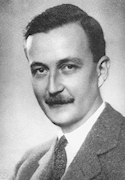 5/10/2013 - AHF publishes documents supporting the exoneration of Count János Esterházy (the only member of the Slovak Parliament in 1942 who voted against expelling the Jews, he was convicted on trumped up charges and died in a communist prison). The documents attest to his principled stand and actions to save Jews during World War II and protect the Hungarian minority in Slovakia, and includes letters from Simon Wiesenthal, Yad Veshem, and historians Dr. Magda Ádám and Dr. István Deák, Professor Emeritus from Columbia University. 5/10/2013 - AHF publishes documents supporting the exoneration of Count János Esterházy (the only member of the Slovak Parliament in 1942 who voted against expelling the Jews, he was convicted on trumped up charges and died in a communist prison). The documents attest to his principled stand and actions to save Jews during World War II and protect the Hungarian minority in Slovakia, and includes letters from Simon Wiesenthal, Yad Veshem, and historians Dr. Magda Ádám and Dr. István Deák, Professor Emeritus from Columbia University.
It is regrettable when contemporary politics driven by totalitarian ideology attempts to revise, ignore or obliterate historical facts. Such shameful falsification of history is what is happening in the case of Janos Esterhazy, a principled anti-fascist who saved Jewish lives during the Second World War and championed the rights of the Hungarian minority in Slovakia. [read more]
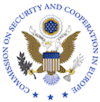 3/19/2013 -- United States Helsinki Commission holds Hearing entitled, "The Trajectory of Democracy – Why Hungary Matters" to "examine Hungary’s constitutional changes with a particular view to the independence of the judiciary, present-day Hungary’s relationship to its Holocaust-era past, and the implications of Hungary’s sweeping legal changes for civil society, including an independent media and religious organizations." AMERICAN HUNGARIAN FEDERATION TESTIMONY ENTERED INTO RECORD. [read more] 3/19/2013 -- United States Helsinki Commission holds Hearing entitled, "The Trajectory of Democracy – Why Hungary Matters" to "examine Hungary’s constitutional changes with a particular view to the independence of the judiciary, present-day Hungary’s relationship to its Holocaust-era past, and the implications of Hungary’s sweeping legal changes for civil society, including an independent media and religious organizations." AMERICAN HUNGARIAN FEDERATION TESTIMONY ENTERED INTO RECORD. [read more]
 Slovakia stripping citizenship of ethnic Hungarian minorities. Slovakia stripping citizenship of ethnic Hungarian minorities.
12/14/2011 - UPDATE: The Case of Ilonka Tamas. The latest outrage from Slovakia: a 99-year-old teacher loses her citizenship. Ilonka Tamás was born in 1912 when Rimaszombat was part of Hungary. She brought up generations of children and received the “Komenský” medal and the Gold Medal of the Slovak Republic for her pedagogical achievements. She merely wanted to regain her Hungarian citizenship but is now a "person without a registered address." AHF submits follow up letter to the U.S. Helsinki Commission. [read more]
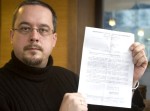 12/02/2011 - Slovakia strips citizenship to ethnic Hungarian minorties who assert their right to dual citizenship in violation of their own Constitution. AHF submits a statement to the US Congress Helsinki Commission: "Intolerance and discrimination targeting any group based on ethnicity, nationality or religion is not acceptable... The most recent anti-Hungarian incident involves Slovakia stripping Oliver Boldoghy of his Slovak citizenship after becoming a dual citizen. This decision is not only contrary to American and European practices, it violates the Slovak constitution, which provides that “no one must be deprived of the citizenship of the Slovak Republic against his will.” [read more] 12/02/2011 - Slovakia strips citizenship to ethnic Hungarian minorties who assert their right to dual citizenship in violation of their own Constitution. AHF submits a statement to the US Congress Helsinki Commission: "Intolerance and discrimination targeting any group based on ethnicity, nationality or religion is not acceptable... The most recent anti-Hungarian incident involves Slovakia stripping Oliver Boldoghy of his Slovak citizenship after becoming a dual citizen. This decision is not only contrary to American and European practices, it violates the Slovak constitution, which provides that “no one must be deprived of the citizenship of the Slovak Republic against his will.” [read more]
 11/8/2011 - The Anti-Defamation League presented the Jan Karski Courage to Care Award to Count Janos Esterhazy. This comes just two months after the Slovak President shamefully calls this hero of the Holocaust a follower of Hitler. 11/8/2011 - The Anti-Defamation League presented the Jan Karski Courage to Care Award to Count Janos Esterhazy. This comes just two months after the Slovak President shamefully calls this hero of the Holocaust a follower of Hitler.  AHF continues to express concern over Slovakia's anti-Hungarian measures."Those who defended and aided Jews and other victims of the Nazislaughter merit our recognition and our eternal thanks. They were individuals who followed the call to conscience, which is surely no simple matter...Count János Esterházy was such a person of conscience, one who had more than enough reason to remain silent." [read more] AHF continues to express concern over Slovakia's anti-Hungarian measures."Those who defended and aided Jews and other victims of the Nazislaughter merit our recognition and our eternal thanks. They were individuals who followed the call to conscience, which is surely no simple matter...Count János Esterházy was such a person of conscience, one who had more than enough reason to remain silent." [read more]
 9/29/2011 - Federation again raises minority rights. In a letter to Knut Vollebaek, OSCE High Commissioner on National Minorities, the Federation again raises anti-Hungarian measures in Slovakia and Serbia and requests the High Commissioner's clarification of reports in the electronic media asserting that he had labeled Hungary's support for Slovakia's Hungarian minority "malicious and foolish." [read more] 9/29/2011 - Federation again raises minority rights. In a letter to Knut Vollebaek, OSCE High Commissioner on National Minorities, the Federation again raises anti-Hungarian measures in Slovakia and Serbia and requests the High Commissioner's clarification of reports in the electronic media asserting that he had labeled Hungary's support for Slovakia's Hungarian minority "malicious and foolish." [read more]
 9/13/2011 - Slovak President shamefully calls Janos Esterhazy, a hero of the Holocaust, a follower of Hitler. AHF continues call for rehabilitation of Janos Esterhazy, reacts to Slovak falsification of history... Esterhazy was the only member of the Slovak Parliament in 1942 who voted against expelling the Jews, setting an example which few dared to follow in the parts of Europe controlled by Adolf Hitler's Germany. He was detained by the Nazis and died in a communist prison. Officially he is still classified as a war criminal in Slovakia, as courts have rejected requests for his rehabilitation. [read more] 9/13/2011 - Slovak President shamefully calls Janos Esterhazy, a hero of the Holocaust, a follower of Hitler. AHF continues call for rehabilitation of Janos Esterhazy, reacts to Slovak falsification of history... Esterhazy was the only member of the Slovak Parliament in 1942 who voted against expelling the Jews, setting an example which few dared to follow in the parts of Europe controlled by Adolf Hitler's Germany. He was detained by the Nazis and died in a communist prison. Officially he is still classified as a war criminal in Slovakia, as courts have rejected requests for his rehabilitation. [read more]
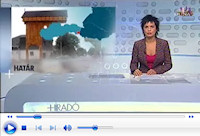 4/27/2010 - UPDATE: AHF remains concerned that authorities continue to raise barriers to divide this community... In 2004, AHF, working closely with member the Center for Hungarian American Congressional Relations (CHACR), worked to publicize the fate of villagers of Szelmenc, the "Village Cut in Two" / "A Kettévágott Falu." In 2005, a year after a successful Congressional briefing, the parties agreed to finally open a border crossing. Important historically and morally to the local Hungarian community, both sides were also optimistic regarding what a border crossing and increased traffic could mean economically. Short-term, both sides of the border experienced much needed development. But the very same Schengen guidelines used to open the border seem to have raised new barriers. The cost for the visa alone (35 Euros), exceeds monthly salaries for most in this, one of the poorest locations in Subcarpathia (Kárpátalja), making crossing the border virtually impossible. In December 2010, DunaTV issued a report entitled "Visa requirements replace barbed wire as barrier to border crossing" / "A szögesdrót helyett most a vízumkényszer választja el a szelmencieket." See the video in Hungarian [ 4/27/2010 - UPDATE: AHF remains concerned that authorities continue to raise barriers to divide this community... In 2004, AHF, working closely with member the Center for Hungarian American Congressional Relations (CHACR), worked to publicize the fate of villagers of Szelmenc, the "Village Cut in Two" / "A Kettévágott Falu." In 2005, a year after a successful Congressional briefing, the parties agreed to finally open a border crossing. Important historically and morally to the local Hungarian community, both sides were also optimistic regarding what a border crossing and increased traffic could mean economically. Short-term, both sides of the border experienced much needed development. But the very same Schengen guidelines used to open the border seem to have raised new barriers. The cost for the visa alone (35 Euros), exceeds monthly salaries for most in this, one of the poorest locations in Subcarpathia (Kárpátalja), making crossing the border virtually impossible. In December 2010, DunaTV issued a report entitled "Visa requirements replace barbed wire as barrier to border crossing" / "A szögesdrót helyett most a vízumkényszer választja el a szelmencieket." See the video in Hungarian [ Magyarul] Magyarul]
 3/22/2010 - AHF President discusses Slovak Language Law with OSCE High Commissioner on National Minorities, Knut Vollebaek and submits follow up letter: "...[Slovakia's] actions include the gerrymandering of the administrative division of Slovakia so that Hungarians are in the minority; adopting a resolution proposed by extremist Jan Slota ratifying and confirming the Benes decrees; and refusing to rehabilitate Janos Esterhazy, who as leader of the Hungarian Party in Tiso’s Fascist Slovakia was the only Member of Parliament to vote against the deportation of Jews in 1942, yet who died in a Czechoslovak prison after the war." [read more] 3/22/2010 - AHF President discusses Slovak Language Law with OSCE High Commissioner on National Minorities, Knut Vollebaek and submits follow up letter: "...[Slovakia's] actions include the gerrymandering of the administrative division of Slovakia so that Hungarians are in the minority; adopting a resolution proposed by extremist Jan Slota ratifying and confirming the Benes decrees; and refusing to rehabilitate Janos Esterhazy, who as leader of the Hungarian Party in Tiso’s Fascist Slovakia was the only Member of Parliament to vote against the deportation of Jews in 1942, yet who died in a Czechoslovak prison after the war." [read more]
 2/16/2009 -- AHF urges OSCE High Commissioner on National Minorities to increase pressure on Slovakia to repeal oppressive language law. "The language law is the latest manifestation of the Slovak government’s intolerance toward its Hungarian minority. Not surprisingly, the Slovak National Party (“SNS”) is a member of the ruling coalition. Its chairman Jan Slota is known for his xenophobia: “Hungarians are the cancer of the Slovak nation, without delay we need to remove them from the body of the nation.” [read more] 2/16/2009 -- AHF urges OSCE High Commissioner on National Minorities to increase pressure on Slovakia to repeal oppressive language law. "The language law is the latest manifestation of the Slovak government’s intolerance toward its Hungarian minority. Not surprisingly, the Slovak National Party (“SNS”) is a member of the ruling coalition. Its chairman Jan Slota is known for his xenophobia: “Hungarians are the cancer of the Slovak nation, without delay we need to remove them from the body of the nation.” [read more]
![AHF urges Secretary of State Hillary Clinton to "publicly and unambiguously express [her] concern relative to the language law that took effect on September 1, 2009 in Slovakia. By curtailing or eliminating the use of minority languages from the public sphere, that discriminatory law threatens the Hungarian minority’s culture and infringes on fundamental freedoms.](images/hillary_clinton.jpg) 2/3/2009 -- AHF urges Secretary of State Hillary Clinton to "publicly and unambiguously express [her] concern relative to the Slovak language law. By curtailing or eliminating the use of minority languages from the public sphere, that discriminatory law threatens the Hungarian minority’s culture and infringes on fundamental freedoms." [read more] 2/3/2009 -- AHF urges Secretary of State Hillary Clinton to "publicly and unambiguously express [her] concern relative to the Slovak language law. By curtailing or eliminating the use of minority languages from the public sphere, that discriminatory law threatens the Hungarian minority’s culture and infringes on fundamental freedoms." [read more]
 1/12/10 -- AHF urged Vice President Biden to discuss policies with his "Romanian interlocutors that they should adopt to strengthen Romania's democratic institutions and respect the rights of its Hungarian minority" during his trip to Romania. Frank Koszorus, Jr., co-president and chairman of the Federation's International Relations Committee reports, "We understand that issues relating to the Hungarian minority were raised." [read more] 1/12/10 -- AHF urged Vice President Biden to discuss policies with his "Romanian interlocutors that they should adopt to strengthen Romania's democratic institutions and respect the rights of its Hungarian minority" during his trip to Romania. Frank Koszorus, Jr., co-president and chairman of the Federation's International Relations Committee reports, "We understand that issues relating to the Hungarian minority were raised." [read more]
 1/9/10 -- AHF calls upon Vice President Biden to discuss Slovakia's language law with Hungarian Prime Minister Bajnai during the latter's trip to Washington, "with a resolution that Slovakia be urged to repeal this discriminatory law." 1/9/10 -- AHF calls upon Vice President Biden to discuss Slovakia's language law with Hungarian Prime Minister Bajnai during the latter's trip to Washington, "with a resolution that Slovakia be urged to repeal this discriminatory law."
[Read more]
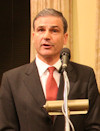 11/27/09 -- American Hungarian Federation and others express their concern about sweeping statements made by Ambassador in interview concerning Hungary. The Washington Times publishes Federation's letter and former Foreign Service Officer pens letter to the Ambassador. "[The Ambassador is] ignoring an exceedingly complex social problem that not even the government has been able to address effectively. While discussing prejudice, he also could have referred to the intolerance toward the Hungarian minorities throughout the region." [Read more] 11/27/09 -- American Hungarian Federation and others express their concern about sweeping statements made by Ambassador in interview concerning Hungary. The Washington Times publishes Federation's letter and former Foreign Service Officer pens letter to the Ambassador. "[The Ambassador is] ignoring an exceedingly complex social problem that not even the government has been able to address effectively. While discussing prejudice, he also could have referred to the intolerance toward the Hungarian minorities throughout the region." [Read more]
 11/24/09 -- "Elfogadhatatlan a szlovák politika." The American Hungarian Federation's call for greater cooperation among Hungarian American organizations in raising the ill-advised and discriminatory Slovak language law published in Heti Valasz. The same letter questions conclusions about various foreign policy issues made in an earlier interview. [Read more] 11/24/09 -- "Elfogadhatatlan a szlovák politika." The American Hungarian Federation's call for greater cooperation among Hungarian American organizations in raising the ill-advised and discriminatory Slovak language law published in Heti Valasz. The same letter questions conclusions about various foreign policy issues made in an earlier interview. [Read more]
 6/30/2009 - Use of Hungarian ILLEGAL in Slovakia... Hungary's Foreign Ministry expressed regret and concern over the amendment to Slovakia's act on its official language approved in parliament on Tuesday. Under the amended act the use of the minority language in official communication would be punishable in towns and villages where the ethnic community makes up less than 20 percent of the total population. [read more] 6/30/2009 - Use of Hungarian ILLEGAL in Slovakia... Hungary's Foreign Ministry expressed regret and concern over the amendment to Slovakia's act on its official language approved in parliament on Tuesday. Under the amended act the use of the minority language in official communication would be punishable in towns and villages where the ethnic community makes up less than 20 percent of the total population. [read more]
 11/23/08 - AHF Submits Letter Regarding Intolerance in Slovakia -- On November 21, 2008, the American Hungarian Federation submitted a letter to Slovak Foreign Minister Jan Kubis who was visiting Washington, D.C. The Federation's letter raised concern over the intolerant and discriminatory policies and practices aimed at Slovakia's Hungarian minority. 11/23/08 - AHF Submits Letter Regarding Intolerance in Slovakia -- On November 21, 2008, the American Hungarian Federation submitted a letter to Slovak Foreign Minister Jan Kubis who was visiting Washington, D.C. The Federation's letter raised concern over the intolerant and discriminatory policies and practices aimed at Slovakia's Hungarian minority.
[read more]
 3/1/2008 - AHF joins international petition effort to call attention to the Benes Decrees. On September 20, 2007, the Slovak Parliament adopted a resolution proposed by extremist
Jan Slota ratifying and confirming the Benes decrees. This is unacceptable. Make your feelings known. [Sign the petition] and read more about the cruel [Benes Decrees] which unjustly expelled thousands of Hungarian families from their ancestral homelands. 3/1/2008 - AHF joins international petition effort to call attention to the Benes Decrees. On September 20, 2007, the Slovak Parliament adopted a resolution proposed by extremist
Jan Slota ratifying and confirming the Benes decrees. This is unacceptable. Make your feelings known. [Sign the petition] and read more about the cruel [Benes Decrees] which unjustly expelled thousands of Hungarian families from their ancestral homelands.
See where the [demonstrations] will be held and get involved!
 10/20/2007
- Slovakia inexplicably confirms the Benes Decrees. "Hungarians are the cancer of the Slovak nation,
without delay we need to remove them from the body of the nation"
- Jan Slota. AHF International Affairs Committee releases statement on
the Benes Decrees and recent extremist developments in Slovakia.
"Having taken a step that has fueled ethnic hatred and assaulted
good relations with Hungary, the Slovak Parliament on September 20, 2007
adopted a resolution proposed by extremist Jan Slota ratifying and confirming
the Benes decrees. Those decrees shamefully imposed collective guilt on
the Hungarian (and German) population of Czechoslovakia in 1945 and stripped
them of their citizenship, rights and property without compensation. Czechoslovakia
also pursued a policy of ethnic cleansing in southern Slovakia. The debilitations
continue to affect many of the victims of the crimes committed in post-World
War II Czechoslovakia. 10/20/2007
- Slovakia inexplicably confirms the Benes Decrees. "Hungarians are the cancer of the Slovak nation,
without delay we need to remove them from the body of the nation"
- Jan Slota. AHF International Affairs Committee releases statement on
the Benes Decrees and recent extremist developments in Slovakia.
"Having taken a step that has fueled ethnic hatred and assaulted
good relations with Hungary, the Slovak Parliament on September 20, 2007
adopted a resolution proposed by extremist Jan Slota ratifying and confirming
the Benes decrees. Those decrees shamefully imposed collective guilt on
the Hungarian (and German) population of Czechoslovakia in 1945 and stripped
them of their citizenship, rights and property without compensation. Czechoslovakia
also pursued a policy of ethnic cleansing in southern Slovakia. The debilitations
continue to affect many of the victims of the crimes committed in post-World
War II Czechoslovakia.
The concept of collective guilt is abhorrent to Americans and to anyone
committed to the rule of law, human rights and democracy. Rather than
affirm the inviolability of the Benes decrees, Slovakia should reject
them, provide legal redress to remedy their continuing and discriminatory
effect and thereby adopt the values shared by the trans-Atlantic community
of nations. [download
the statement]
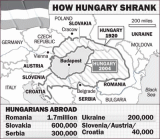 7/5/2005 - The
Benes Decrees and Post Communist-era Developments... The 1945 Benes Decrees claimed collective World War II responsibility
of Germans and Hungarians living in Czechoslovakia, and deprived them
of their rights, their property and expelled many of them from the country.
The Decrees, formally, are still in force. Austria, Germany, and Hungary
are have called for the repeal of the laws. 7/5/2005 - The
Benes Decrees and Post Communist-era Developments... The 1945 Benes Decrees claimed collective World War II responsibility
of Germans and Hungarians living in Czechoslovakia, and deprived them
of their rights, their property and expelled many of them from the country.
The Decrees, formally, are still in force. Austria, Germany, and Hungary
are have called for the repeal of the laws.
According to the Decrees, 2.5 million ethnic Germans (Sudetendeutsch)
and approximately 40,000 Hungarians were lost their Czechoslovakian citizenship,
their land was expropriated and they were exiled. This transition was
carried out over 1945-46, and was in many cases badly administered and
brutal. Many people lost their lives. Ethnic Czechs were moved in to fill
the empty towns. [Read more] and see a chronology of events.
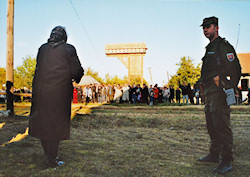 Szelmenc:
The Village Cut in Two... Seen here - relatives yelling across
the border which runs through main street. Szelmenc:
The Village Cut in Two... Seen here - relatives yelling across
the border which runs through main street.
3/11/2005
- UPDATE - A Huge Victory! Szelmenc
border crossing to open! - A long-awaited border crossing for
the divided village of Szelmenc will soon open according to a recent decision
of the Slovak government. AHF worked with its member and
lead organization in the effort CHACR. CHACR was able to mobilize the
American Hungarian Congressional Caucus and the Hungarian American Community
to urge Slovakia and the Ukiraine to end this cold-war division. [read more]
2/4/2005 - Hungarians have until September
2005 to formally request return of confiscated properties in Slovakia
under the Benes Decrees. The "Szabad Ujsag" weekly
has published a list of those lands, which were taken away during the
Benes programs. The original owners or their descendants may recover these
expropriated lands and properties if they can prove their ownership and
relationships to the original owner. The validated documents have to be
shown to the proper athorities. One catch is that it has to be proven
before September 1 of 2005.
[Check
the Database - in Hungarian and Slovak from Szabad
Ujsag and the Hungarian
Human Rights Foundation]
 4/21/2004
- Successful United States Congress Briefing on Szelmenc: Congresswoman
Diane Watson calls for opening border... 4/21/2004
- Successful United States Congress Briefing on Szelmenc: Congresswoman
Diane Watson calls for opening border...
The mayors of both sides of Szelmenc, the village divided in two, testified
along with the Ambassadors of Slovakia and the Ukraine, and the President
of the Center for Hungarian American Congressional Relations before the
Congressional Human Rights Caucus regarding the desperate situation. The
Ambassador of Slovakia committed to finding a solution
to this "nonsensical situation." Ukranian Counselor agrees. [read more]
[<< Back to All AHF News]
| Selected International Coverage
 12/5/2011 - American-Hungarian Federation turns to US Congress over widening Slovak citizenship row. The American-Hungarian Federation has turned to the US Congress Helsinki Commission with an appeal for it to take action in the case of a Slovak of Hungarian origin who has been stripped of his citizenship on the ground that he took up Hungarian citizenship, the alliance’s chairman told MTI. [read more] 12/5/2011 - American-Hungarian Federation turns to US Congress over widening Slovak citizenship row. The American-Hungarian Federation has turned to the US Congress Helsinki Commission with an appeal for it to take action in the case of a Slovak of Hungarian origin who has been stripped of his citizenship on the ground that he took up Hungarian citizenship, the alliance’s chairman told MTI. [read more]
 [ [  MTI cikk magyarul] "Álláspontjának Tisztázására Szólította Fel az EBESZ Kisebbségügyi Főbiztosát az Amerikai Magyar Szövetség" - MTI 2011. szeptember 30., péntek 1:14 MTI cikk magyarul] "Álláspontjának Tisztázására Szólította Fel az EBESZ Kisebbségügyi Főbiztosát az Amerikai Magyar Szövetség" - MTI 2011. szeptember 30., péntek 1:14
----
 Hovorte po slovensky!* Slovakia criminalises the use of Hungarian: The Economist, Jul 30, 2009 Hovorte po slovensky!* Slovakia criminalises the use of Hungarian: The Economist, Jul 30, 2009
LANGUAGE laws may protect minority rights or infringe them. Slovakia’s new law, which comes into force on September 1st, is under fire for its harshness. It imposes fines of up to €5,000 ($7,000) on those who break rules promoting the use of Slovak in public. [read more]
Why So Many Hungarians Across the Border?
 One
thousand years of nation building successfully delineated groups
based on culture, religion, geography, and other attributes to create
the countries with which we are so familiar. While some Western European
nations would continue power struggles and princely battles and civil
wars, Hungary, founded in 896, was a peaceful multi-ethnic state for a
1000 years and her borders were virtually unchanged. Until 1920... One
thousand years of nation building successfully delineated groups
based on culture, religion, geography, and other attributes to create
the countries with which we are so familiar. While some Western European
nations would continue power struggles and princely battles and civil
wars, Hungary, founded in 896, was a peaceful multi-ethnic state for a
1000 years and her borders were virtually unchanged. Until 1920...
The Treaty of Trianon in 1920... in the aftermath of WWI, was extremely harsh on Hungary
and unjustifiably one-sided. The resulting "treaty" lost Hungary
an unprecedented 2/3 of her territory, and 1/2 of her total population
or 1/3 of her Hungarian-speaking population. Add to this the loss of up
to 90% of vast natural resources, industry, railways, and other infrastructure.
In the newly created Slovakia, the tragedy of 1920 that befell the historic Hungarian communities was only the beginning. The Benes Decrees sent millions of people, who had lived in the region for
many centuries, off in sealed wagons, away from their homes, their families
- not to mention the odd ones who died on the trip. Tens of thousands of these were Hungarian. More recently, the Slovak Language Law makes the use of the minority language in official communication punishable in towns and villages where the ethnic community makes up less than 20 percent of the total population. The amendment requires that all documentation of minority schools should be duplicated in the state language. The law stipulates that the names of streets and buildings anywhere in Slovakia must be stated in the Slovak language [despite 1100-year-old tradition] and it also introduces sanctions of 100 to 5000 euros for municipalities and public offices for not using the Slovak language "properly."
The following graphic shows ethnic distribution in Slovakia and population decline from 1910 - 1991:

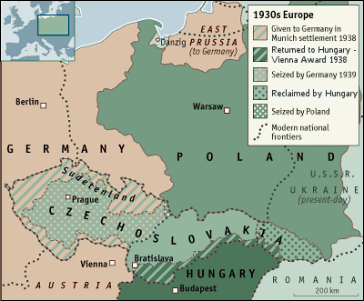
Ethnic Distribution in the Kingdom of Hungary in 1910 (Hungarians shown in red)
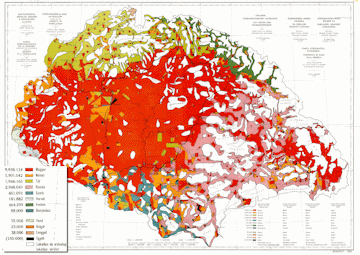
[download extra large image 4962x3509]
[download large image 1000x707]
Hungarian populations declined significantly after forced removals such as the Benes Decrees and other pograms, the effects of WWI, and Trianon in 1920. With continued pressure and discriminative policies such as the 2009 Slovak Language Law, this trend continued over the past 90 years.
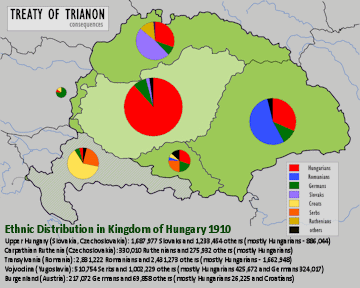
- In Upper Hungary (awarded to Slovakia, Czechoslovakia): 1,687,977 Slovaks and 1,233,454 others (mostly Hungarians - 886,044, Germans, Ruthenians and Roma) [according to the 1921 census, however, there were 1,941,942 Slovaks and 1,058,928 others]
- In Carpathian Ruthenia (awarded to Czechoslovakia): 330,010 Ruthenians and 275,932 others (mostly Hungarians, Germans, Romanians, and Slovaks)
- In Transylvania (awarded to Romania): 2,831,222 Romanians (53.8%) and 2,431,273 others (mostly Hungarians - 1,662,948 (31.6%) and Germans - 563,087 (10.7%)). The 1919 and 1920 Transylvanian censuses indicate a greater percentage of Romanians (57.1%/57.3%) and a smaller Hungarian minority (26.5%/25.5%)
- In Vojvodina 510,754 Serbs and 1,002,229 others (mostly Hungarians 425,672 and Germans 324,017)
- In Vojvodina and Croatia-Slavonia combined (awarded to Yugoslavia): 2,756,000 Croats and Serbs and 1,366,000 others (mostly Hungarians and Germans)
- In Burgenland (awarded to Austria): 217,072 Germans and 69,858 others (mainly Croatian and Hungarian)
Links
Related Articles
By Any Other Name: Hungary, Apartheid,
and the Benes Decrees
by Christopher Szabó,
diacritica.com
April 3, 2002
These decrees sent millions of people, who had lived in the region for
many centuries, off in sealed wagons, away from their homes, their families
- not to mention the odd ones who died on the trip.
WHAT THE BENES DECREES SAY
One may be forgiven for suspecting, by the casual way the Benes Decrees
are often disparaged by commentators, that many of those who write about
the Decrees have never taken the trouble to [read
them].
Living as I have for over 20 years in South Africa, I know this language
well. It is the language of Apartheid.
There is no moral difference, to my mind, in withdrawing civil rights,
confiscating private property and deporting people, whether they be Black
South Africans sent to some "Homeland/Bantustan," or Armenians,
or deported Chechens, or Germans and Hungarians.
The Hungarians who lived in what is now Slovakia and Trans-Carpathian
Ukraine (which was given to Stalin by a grateful Benes in 1945) were more
than one million strong in 1910. By 1930, thanks to the above-mentioned
"administrative" cleansing, their numbers had been reduced to
585,434. After Hungary reclaimed its lands in 1939, people began moving
back to their homes. In 1941-45, there were about 761,000 in what is today
Slovakia alone. [read
more]
Allied Omertá:
Shattering the Code of Silence About the Benes Decrees
by Christopher Szabó,
diacritica.com
April 3, 2002
The "Benes Decrees" began in the mind of Czech
statesman Edvard Benes sometime in 1940. He made some quite clear statements
about his plans by 1941. The plans? To kill and/or expel all people of
German or Hungarian ethnicity/language from a reunited Czechoslovakia,
which had fallen apart at the start of the war. This is
the sort of thing you would expect from a Himmler or a Beria, not a guy
who is lionised in Western history books, and generally books about Central
Europe, as the only true "democrat" in the region. But Czechoslovakia
was never a complete democracy. Just as interwar Hungary, or Poland, or
Yugoslavia, were not. Not quite. In Czechoslovakia, designed as a "national
homeland" for Slavs, the Slavic Rusyns had to have two votes to equal
one Czech vote! Democracy? [read
more]
THE PRESIDENTIAL DECREES
OF EDWARD BENES
1945-1948
Courtesy
of the Corvinus
Online Library
The first Czechoslovak Republic (1918-1938) was recreated in 1945 at
the end of World War II and existed until the end of 1992. In both cases,
Czechoslovakia utterly failed to form a governmental structure that secured
freedom, prosperity, peace, and equal rights for all citizens of the state.
In 1918, the newly founded Czechoslovak Republic was entirely carved
out of the Austro-Hungarian dual monarchy by a unilateral decision of
the victorious entente powers. The dictated peace treaties of Versailles,
Saint-Germain-en-Laye and Trianon were not an outcome of a true peace
conference at which the defeated would also have been given the opportunity
to enunciate the limits of acceptable conditions for peace. Such a peace
conference was never assembled.
The Versailles peace treaty with Germany was condemned by non-interested
parties. In fact, the US Secretary of State, Robert Lansing, had declared
that "the Versailles treaty menaces the existence of civilization,"
and two popes had stigmatized the instrument. Benedict XV condemned it
for "the lack of an elevated sense of justice, the absence of dignity,
morality or Christian nobility," and Pius XI, in his 1922 encyclical
"Ubi arcam Dei," deplored an artificial peace set down on paper
"which instead of arousing noble sentiments increases and legitimizes
the spirit of vengeance and rancour."
The peace treaty of Trianon (1920) with Hungary resulted in the dismemberment
of the thousand- year- old Hungarian Kingdom, as a result of an unbelievably
inimical attitude of the allied representatives toward the Magyars. The
consequence to Hungary was a loss of 71.5% of its territory and 63.6%
of its population. The extreme tragedy of Hungary can be illustrated by
comparing the smaller losses in 1871 of France to Germany, in which France
gave up 2.6% of its territory and 4.1% of its population to Germany. The
Trianon treaty forced three and a half million Magyars to live, without
their consent, in Czechoslovakia, the Kingdom of the Serbs, Croats and
Slovenians and Rumania, with the stroke of a pen. The right of self-determination
of nations, solemnly promised in the 14 points of US President Woodrow
Wilson, was apparently forgotten. [more]
Corvinus.com - Czech and Slovak Affairs Page
Also see the Hungarian
Forum in Australia
The Hungarian Problem
Or, the Hungarians are the Problem
Christopher Szabó, diacritica.com
Autumn, 1998
Newly Elected Prime Minister Viktor Orban said it well: "The borders of the Hungarian nation and the Hungarian State do not
coincide." This is true, as witness the fact that fully one-third
of all Hungarians are minorities in neighbouring countries, most just
on the far side of the border.
This is, naturally, a problem for Hungarians. It is
also a problem for all the states who got Hungarian lands. Many in neighbouring
countries, and politicians in many more, have said in the past, and no
doubt will say in the future: "Why don't they just go home?!!"
But they are home!
 They
are home in the sense that they, as communities, haven't moved anywhere.
They just woke up one morning to be told: "You are now a Czechoslovak,
you are a Romanian, you are a Yugoslav." This first happened in 1918-20,
when Hungary was partitioned by the infamous Trianon Treaty, which was
not a treaty at all, but a diktat enforced by occupying Entente Armies.
In the late 1930's, Hungary got some portions of its territories back,
but after losing yet another war, the borders were tightened even more
in 1947. They
are home in the sense that they, as communities, haven't moved anywhere.
They just woke up one morning to be told: "You are now a Czechoslovak,
you are a Romanian, you are a Yugoslav." This first happened in 1918-20,
when Hungary was partitioned by the infamous Trianon Treaty, which was
not a treaty at all, but a diktat enforced by occupying Entente Armies.
In the late 1930's, Hungary got some portions of its territories back,
but after losing yet another war, the borders were tightened even more
in 1947.
The key weakness of these treaties was that neither ever asked - or cared
- what the local population wanted. Did they want to join a new state
(e.g., Czechoslovakia) did they want to stay with Hungary, or did they
want independence or autonomy or what?
The fact that these questions have never even been asked, let alone answered,
in a supposedly democratic age, remains the central problem of the Hungarian
minorities in the countries immediately surrounding Hungary. [more] [back
to all AHF news]
A
Case Study on Trianon
The Corvinus Library
 ..."the
American government accepts, against its better judgment, the decision
not to announce a plebiscite in the matter of the final drafting of frontiers.
He believes that in many respects the frontiers do not correspond to the
ethnic requisite, nor to economic necessity, and that significant modifications
would be in order, particularly in the Ruthenian area." Later on
Wallace submitted for the consideration of the Great Powers proposals
with regard to a restoration of the economic unity of the Danubian states.
The American initiative, however, came too late ... The only thing left
was the Millerand cover letter, which did not oblige anyone to do anything! ..."the
American government accepts, against its better judgment, the decision
not to announce a plebiscite in the matter of the final drafting of frontiers.
He believes that in many respects the frontiers do not correspond to the
ethnic requisite, nor to economic necessity, and that significant modifications
would be in order, particularly in the Ruthenian area." Later on
Wallace submitted for the consideration of the Great Powers proposals
with regard to a restoration of the economic unity of the Danubian states.
The American initiative, however, came too late ... The only thing left
was the Millerand cover letter, which did not oblige anyone to do anything!
The Hungarian peace delegation signed the peace treaty consisting of
14 points at the so-called Great Trianon palace, near Paris, on June 4,
1920. Hungary's fate was determined for an unforeseeable future by the
second part of the treaty which defined the new borders. According to
this section Hungary's area (without Croatia) would be reduced from 282,000
km2 to 93,000 km2, whereas its population decreased from 18 million to
7.6 million. This meant that Hungary lost two thirds of its territory,
whereas Germany lost but 10 percent and Bulgaria but 8 percent to the
benefit of their victorious neighbors.
As regards population, Hungary lost more than 60 percent of its inhabitants
as opposed to the 10 percent lost by Germany. In the lands taken away
from Hungary there lived approximately 10 million persons. Persons of
Hungarian nationality constituted 3,424,000 in the areas taken away from
Hungary. Of these 1,084,000 were attached to Czechoslovakia, 1,705,000
to Romania, 564,000 to Yugoslavia, and 65,000 to Austria. Thus 33.5 percent
of all Hungarians came under foreign rule, i.e., every third Hungarian.
For the sake of comparison. while the treaties of Versailles and Neuilly
placed only one German or one Bulgarian out of every twenty under foreign
rule, the Trianon treaty placed seven out of twenty Hungarians in the
same position.
Furthermore about one half of the Hungarian minority attached to the
neighboring states was ethnically directly next to the main body of Hungarians
on the other side of the borders. Had the peace treaties signed in the
Paris suburbs really tried to bring about, however incidentally, nation-states,
then it would have had to leave at least 11/4 to 2 million more Hungarians
inside Hungary. In contrast the 42 million inhabitants of the successor
states there were about 16 million minorities, as a consequence of which
Czechoslovakia, Romania, and Yugoslavia became multinational states much
like the Austro-Hungarian Monarchy had been. What is more, according to
the census of 1910 the percentage of Hungarians in Hungary had reached
54.4 percent, whereas in the nations that came about as a result of the
peace treaties, in Czechoslovakia and Yugoslavia, the leading Czech and
Serbian elements constituted but a minority as compared to the other ethnic
groups.
The Treaty of Trianon was a great blow to Hungary in economic terms as
well. Hungary was deprived of 62.2 percent of its railroad network, 73.8
percent of its public roads, 64.6 percent of its canals, 88 percent of
its forests, 83 percent of its iron ore mines and of all its salt mines.
At the Peace Conference the Entente powers, in order to satisfy the imperialist
greed of their allies in central Europe, cut across roads, canals, railroad
lines, split cities and villages in two,
deprived mines of their entrances, etc.
There was but one modification of the frontier: thanks to Italian intercession
and the stand taken by patriotic forces in Western Hungary, a plebiscite
was obtained in Sopron and its environs. At the plebiscite of December
4, 1921, 65 percent of the population opted for Hungary.
[go
to Corvinus Trianon Index]
[more
from above excerpt]
[< back to all AHF news]
Join online!

Help us help the community! Donate securely online.
[back to all AHF news]
|



